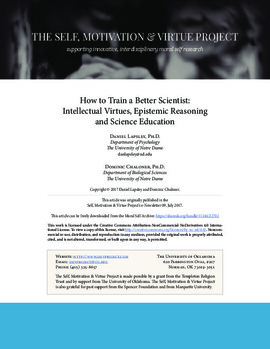| dc.contributor.author | Lapsley, Daniel | |
| dc.contributor.author | Chaloner, Dominic | |
| dc.date.accessioned | 2018-02-23T22:28:04Z | |
| dc.date.available | 2018-02-23T22:28:04Z | |
| dc.date.issued | 2017-07 | |
| dc.identifier.uri | https://hdl.handle.net/11244/54440 | |
| dc.description.abstract | This article was originally published in the Self, Motivation & Virtue Project’s e-Newsletter 09, July 2017. | en_US |
| dc.description.sponsorship | This article was made possible through the support of a grant from Templeton Religion Trust and by support from The University of Oklahoma. The opinions expressed in this article are those of the authors and do not necessarily reflect the views of Templeton Religion Trust or The University of Oklahoma. | en_US |
| dc.language | en_US | en_US |
| dc.rights | Attribution-NonCommercial-NoDerivs 3.0 United States | * |
| dc.rights.uri | https://creativecommons.org/licenses/by-nc-nd/3.0/us/ | * |
| dc.subject | Psychology, General. | en_US |
| dc.subject | Education, Sciences. | en_US |
| dc.subject | Education, General. | en_US |
| dc.title | How to Train a Better Scientist: Intellectual Virtues, Epistemic Reasoning and Science Education | en_US |
| dc.type | Article | en_US |
| dc.description.peerreview | No | en_US |

